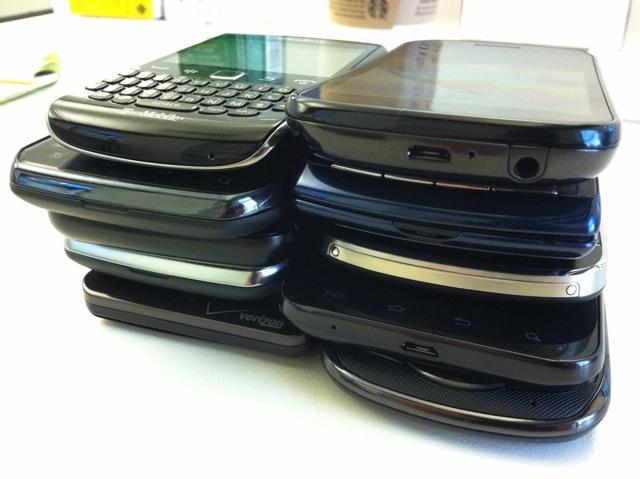
What is a smartphone?
You don't get asked that question very often, as we all have a general idea of what is and isn't a smartphone. But when asked this, it's kind of hard to coherently put the answer to words.
Stumped and curious, I asked a few people sitting around the coffee shop I frequent how they would define a smartphone. Answers ranged from "a pocket computer paired with a phone" to "a phone with highly interactive data applications." Another said, "It used to be the phone I couldn't afford. Now, not so much." These on-the-spot definitions seem pretty close to something I would say or what we could consider a "smart" phone, but they don't quite define what exactly a smartphone is. What differentiates a smartphone from a feature phone? A superphone?
A few years ago, any phone with access to the Internet would technically be considered "smart." Seeing as most wireless providers require feature phone users to pay for a cheaper, more lightweight HTML data plan, this obviously isn't the case anymore. And although they come in short supply, feature phone users also have a selection of JAVA applications and games that will run on their phones. So "a phone with Internet access and the ability to run applications" is a bit too vague to distinguish between a feature phone and smartphone.
If you were to look around the Internet for an official definition, the chances of coming up with one definitive answer are slim. And even if there were one, it would still be rather vague. According to the Wikipedia page for Smartphones, a smartphone is:
"a high-end mobile phone that combines the functions of apersonal digital assistant (PDA) and a mobile phone. Today's models typically also serve as portable media players and camera phones with high-resolution touchscreens, web browsers that can access and properly display standard web pages rather than only mobile-optimized sites, GPS navigation, Wi-Fi and mobile broadband access. The term smartphone is usually used to describe phones with more advanced computing ability and connectivity than a contemporary feature phone, although the distinction can be vague and there is no official definition for what constitutes the difference between them."
This explanation is still rather general and only echoes the fact that the definition of smartphone is flexible and ever-changing. As feature phones start to fade from the equation and the majority of available cellphones are "smart," the matter becomes more convoluted and only leads to more questions. Is it right for all "smartphones" to be grouped together? At what point do we begin to transition into the superphone era? If we're not exactly sure what constitutes calling a device a smartphone, how can we define what is and isn't a superphone?
The question that Aaron brought to me was, "Is it really right to say that the Curve 9360 and DROID BIONIC are both smartphones?"
Quite frankly, no. It's a bit of a leap to flat out say "no." But it's similar to grouping budget cars and luxury cards into the same category. The Curve 9360 is like a Smart Car while the BIONIC is more of a gas-guzzling H3 (or any other luxury car, really). Much like the Smart Car gets you from point A to point B, the 9360 can browse the Internet, run applications from BlackBerry App World and can do virtually anything the BIONIC can. The Hummer, however, gets you from point A to point B in style (if that's what you want to call it) – heated seats if necessary. You're going to burn more gas and likely be more comfortable on the ride, but much of the features are above and beyond, icing on the cake, etc.
Sure, they're both vehicles. But one is the bare minimum while the other has all the bells and whistles. One is essential, the other is a luxury; phones are not all that different.
But if they shouldn't be grouped together, what should low-end devices be? What about high-end devices? Well, it would be tough to rebrand something that has generally been considered a smartphone as something else after years of marketing. By definition – or whatever vague consensus we have come to – BlackBerry handsets and low-end Android phones are smartphones. So should these more powerful, high-end phones with dual-core (and eventually quad-core and beyond) processors be considered superphones? Do the bells and whistles makes them "super" as opposed to just "smart?" And what will happen to said superphones once they become old and the new superphones and much more powerful and fast? Will those old superphones then be demoted to smartphones? If so, then they're not technically "smart" anymore, right? (I know ... enough with the questions already, Taylor. I only have a few more.)
So what is a smartphone? It's subjective and an elastic term. If you think back to when the name "smartphone" was originally coined it was a term used to signify that a particular phone was "smarter" or more capable than other phones. So the definition has vastly changed from a differentiating factor to a generic, overused denomination. Since they all practically do the same and I personally despise using the term "superphone," maybe the "smartphone" moniker should be dropped entirely and only used again when it's actually applicable.
What say you? Do you think the term "smartphone" is inappropriately used or overused? Should low-end and high-end devices both be considered smartphones? What should constitute a phone being "super" as opposed to just "smart?"